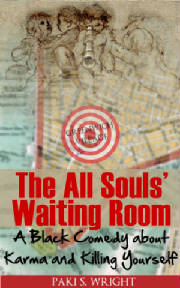The shades of Freud, Jung, and Reich joust to see who can save a young life from
adolescent depression and teen suicide.
The
All Souls' Waiting Room: A Black Comedy about Karma and Killing Yourself by Paki
S Wright 5-Star Amazon rating
 In the 60's, when I was in my teens, I found myself thinking, I want to die. Although my background was belligerently bohemian, I was as far away
from free love - or any love, for that matter -- as a soul could get. In my youthful experience, real love was simply not to be found, free or otherwise, and so I tried
to give up the ghost. In the 60's, when I was in my teens, I found myself thinking, I want to die. Although my background was belligerently bohemian, I was as far away
from free love - or any love, for that matter -- as a soul could get. In my youthful experience, real love was simply not to be found, free or otherwise, and so I tried
to give up the ghost.
The All Souls' Waiting Room is
about the decidedly different childhood that came before my suicidal longings: I was to be kept free of
repressive sexual and societal mores, largely through the child-rearing theories of the brilliant and persecuted psychoanalyst,
Wilhelm Reich.
 In the eighties, I visited Vienna, many years and many brands of therapy after my adolescent suicide attempts
and while I was still struggling to find a way to write about my childhood. The checkered
political history and oddly paradoxical charm of the old city, particularly Freud's flat at 19 Berggasse (before its contents
were moved to London), made a visceral impression on me. Vienna is
to psychoanalysis what Mecca is to Islam; anyone who was anyone in the pioneer days of the field had been there as a pilgrim.
Jung had visited, Reich spent many years as Freud's assistant at the Vienna Psychoanalytic Clinic. Since,
almost at birth, I felt I had been laid on the altar of psychiatry - "Here, fix her! Save her!"
- in Vienna I felt I had found a personal, cosmological home base. In the eighties, I visited Vienna, many years and many brands of therapy after my adolescent suicide attempts
and while I was still struggling to find a way to write about my childhood. The checkered
political history and oddly paradoxical charm of the old city, particularly Freud's flat at 19 Berggasse (before its contents
were moved to London), made a visceral impression on me. Vienna is
to psychoanalysis what Mecca is to Islam; anyone who was anyone in the pioneer days of the field had been there as a pilgrim.
Jung had visited, Reich spent many years as Freud's assistant at the Vienna Psychoanalytic Clinic. Since,
almost at birth, I felt I had been laid on the altar of psychiatry - "Here, fix her! Save her!"
- in Vienna I felt I had found a personal, cosmological home base.  Some time after my return, I had a half-waking dream of a dramatic scene. It seemed inspired,
the answer to my creative problem. It was the scene that was the seed for this book: Some time after my return, I had a half-waking dream of a dramatic scene. It seemed inspired,
the answer to my creative problem. It was the scene that was the seed for this book:
In a celestial version of the Viennese coffeehouse called Demel's, the shades of Sigmund S. Freud, C. G. Jung,
and Wilhelm Reich sit around a round marble table. In front of each of them is a different kind of Sachertorte
on a small plate. The three dead psychoanalysts debate the merits
of the Viennese chocolate cake, Demel's version versus the Hotel Sacher's. Jung, wearing a rumpled white linen
suit, prefers the cake from Demel's. Freud, on the other hand, in three-piece gray wool, insists that the drier
Hotel Sacher's torte is more elegant and besides, it is the original recipe and so by far the best. Reich,
wearing a short white lab coat over dungarees and blue chambray work shirt, tells them they're both wrong, neither Demel's
nor the Hotel Sacher's can compare to the sublime recipe of his mother's.
Schlomo
(Freud's real middle name), Gus, and Willie, as they  think of each other, proceed with their celestial taste-test. Removing an ethereal
cigar from his mouth, substituting a forkful of the Sacher's heady confection, Schlomo Freud chews thoughtfully. "Dreamy!"
he exclaims. "Wunderbar!" think of each other, proceed with their celestial taste-test. Removing an ethereal
cigar from his mouth, substituting a forkful of the Sacher's heady confection, Schlomo Freud chews thoughtfully. "Dreamy!"
he exclaims. "Wunderbar!"
Gus Jung takes a bite of his Sachertorte, the one from Demel's. His small
black eyes close briefly in pleasure. "Magic! Alchemy!" he declares.
Impatiently picking up his piece with his hand, Willie Reich takes several big bites at once. "Orgasmic!"
he bellows. "And much better for you!"
|

